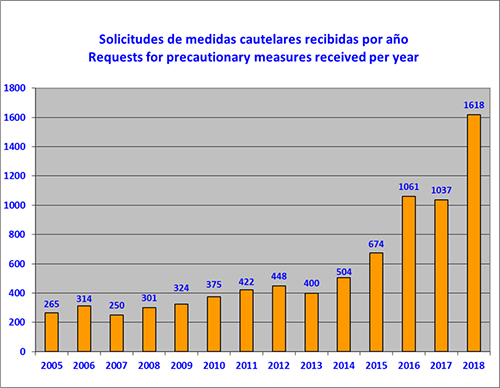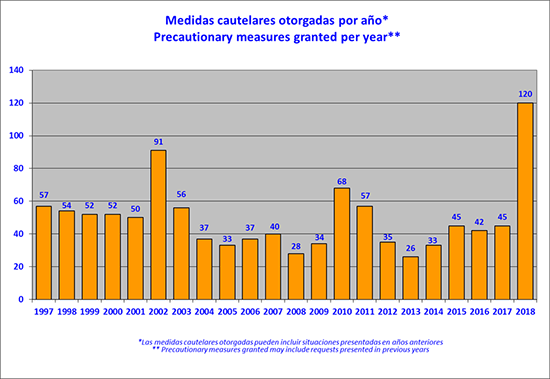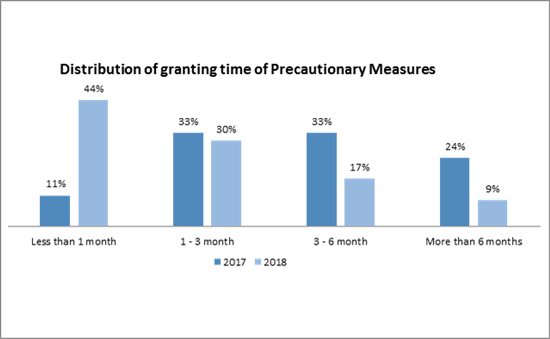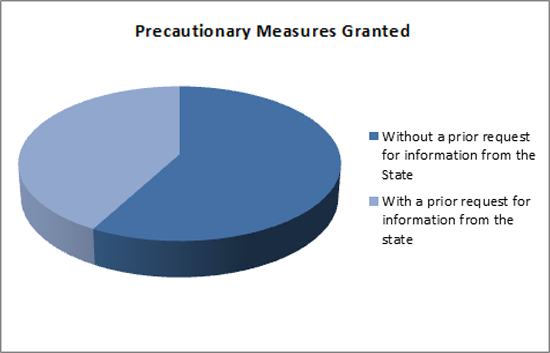IACHR
Press Release
IACHR Presents Overview of the Results of its Precautionary Measures Mechanism for 2018
February 7, 2019
IACHR Press and Communication Office
Tel: +1 (202) 370-9000
[email protected]
Washington, D.C. — In 2018, through its precautionary measures mechanism, the Inter-American Commission on Human Rights (IACHR) continued protecting the rights of people throughout the Americas who are at serious, urgent risk of suffering irreparable harm. The year was marked by a substantial increase in the number of requests for precautionary measures that the IACHR received and the number of these that were granted. Measures were also implemented to expedite processing procedures in order to make responses timelier.
Requests Received
In 2018, the IACHR received 1618 requests for precautionary measures, more than any other year in the organization’s history. This figure is over 50% higher than the number of requests received in 2017. As of February 2019, 100% of the requests received in 2018 had been evaluated in accordance with the requirements set out in Article 25 of the Rules of Procedure.
The IACHR received a large number of requests for precautionary measures from highly vulnerable petitioners during its on-site visits. There was an increase in the use of technology to make the ways petitioners can describe risk more flexible, namely through audio or video recordings of testimonies taken during on-site visits. Many of these requests were submitted in connection with the human rights crisis that has been unfolding in Nicaragua since April 2018.

Measures Granted
A total of 120 precautionary measures were granted, the highest number ever in a single year, and also the highest percentage of measures granted in comparison with the number of requests that were received (7.2%) since the Rules of Procedure were modified in 2013. The measures in question concerned Barbados, Brazil, Chile, Colombia, Cuba, Ecuador, El Salvador, Guatemala, Honduras, Mexico, Nicaragua, Panama, Peru, the United States, and Venezuela. A large number of the precautionary measures that were granted (67) related to the human rights crisis in Nicaragua.
Measures were granted to human rights defenders, journalists, groups that are vulnerable or have been discriminated against historically, such as women, children, and adolescents, communities of African descent, indigenous peoples, forcibly displaced people, members of the LGTB community, people who have been deprived of their freedom, migrants, legal workers, and people with disabilities. Through its decisions, the IACHR has sought to protect life and personal integrity, health, identity and family life, freedom of expression, and other rights affected by the situations in question.

Granting Times
The time in which precautionary measures were granted was significantly reduced in comparison with previous years, averaging 74 days in 2018. Of these measures, the percentage of those granted within a month of the date of the request increased fourfold, from 11% in 2017 to 44% in 2018.
Given the exceptional risk faced by many of the applicants, most of the measures granted in 2018 (58%) were granted without prior requests from information from the relevant state, as is set out in article 25.5 of the Rules of Procedure. In such cases, in accordance with the Rules of Procedure, the IACHR analyzed whether it was appropriate for these measures to remain in force based on information provided by states after the measures were granted.

Measures in Force
In 2018, the IACHR held 41 working meetings and five public hearings at which it directly supervised the implementation of the precautionary measures it had granted, requesting information from states on the progress they had made, timetables or working roadmaps, and agreements between the parties. The IACHR also sent over 700 communiqués to states and state representatives regarding the implementation of measures that were in force. During its on-siteand working visits, the IACHR was able to dialogue with authorities and representatives regarding compliance with precautionary measures. In 2018, the IACHR issued 10 press releases relating to the precautionary measures that were granted.

Progress was also made on states’ involvement in working meetings on precautionary measures. In 2017, the following 9 states took part in the working meetings the IACHR organized regarding precautionary measures: Argentina, Chile, Colombia, Guatemala, Honduras, Mexico, Paraguay, Peru, and Venezuela. In addition to these states, Brazil, and Ecuador also took part in the working meetings on precautionary measures in 2018.
Actions Taken to Streamline Procedures and Increase the Predictability of the Precautionary Measures Mechanism
The IACHR adopted Resolution 3/2018, through which it increased the transparency of some of the issues or claims that it has historically viewed as not being appropriate for analysis using the precautionary measures mechanism because they would entail a detailed pronouncement on the situation in question, which corresponds to the petition and case system. Likewise, the IACHR decided not to continue processing applications for which the regulatory requirements for granting the measure were not met, and regarding which no response was received regarding requests for additional information from the applicants after a prolonged period of time. This has improved the predictability of the precautionary measure mechanism and has sped up decision-making regarding those issues that showing the greatest signs of risk according to IACHR precedents and on which up-to-date information is available.
In 2018, the Executive Secretariat continued to adopt measures to streamline the decision-making process and the handling of requests and precautionary measures granted through portfolios, ensuring that cases that showed signs of being extremely urgent were prioritized appropriately. To ensure the IACHR could continue to provide timely responses to requests, there was a substantial increase in the number of staff working in the Precautionary and Provisional Measures Department in comparison with previous years: the number of legal and administrative personnel doubled in comparison with August 2016, the start of the current Executive Secretary’s term in office.
The IACHR wishes to thank those who requested precautionary measures for their trust and states for their commitment to implementing the precautionary measures that were granted. In 2019, the IACHR will continue to take steps to ensure the precautionary measures mechanism remains efficient. The IACHR is grateful to users of the Inter-American system, including states, civil society, and victims of human rights violations for the role they play in this process.
A principal, autonomous body of the Organization of American States (OAS), the IACHR derives its mandate from the OAS Charter and the American Convention on Human Rights. The Inter-American Commission has a mandate to promote respect for and to defend human rights in the region and acts as a consultative body to the OAS in this area. The Commission is composed of seven independent members who are elected in an individual capacity by the OAS General Assembly and who do not represent their countries of origin or residence.
No. 027/19

